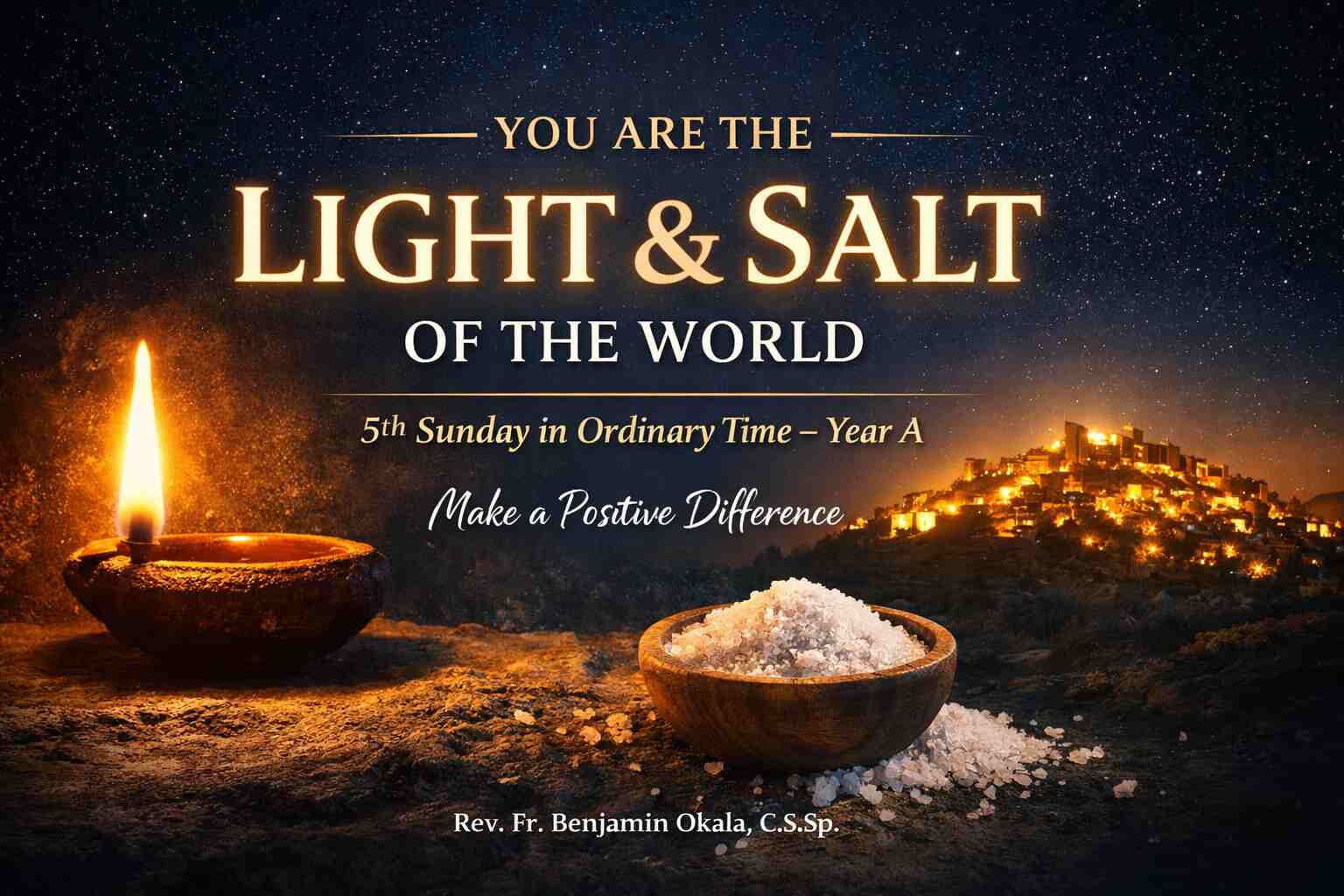Homily of 32nd Sunday in Ordinary Time, Year B
1st Reading: 1 Kings 17:10-16; 2nd Reading: Hebrews 9:24-28; Gospel: Mark 12:38-44
The true measure of a human person is not in his acquisitions (wealth, academic qualification, or positions of honour), but in his character (distinctive qualities). Kenosis, honesty, sincerity, faithfulness, and generosity are the hallmarks of an authentic or reputable personality. Unfortunately, dishonesty, fraudulence, hypocrisy, unfaithfulness, and stinginess seem to have become the norms in our contemporary society.
Regrettably, many people, especially Christians, lack these distinctive and essential qualities in their lives. Especially when the demands for kenotic sacrifice arise. They even find it difficult to sacrifice anything for the sake of others. Instead, some of them have the propensity of defrauding others to enrich themselves. Please join us as we reflect on the kind of sacrifice that attracts God’s attention and rewards.
THE WIDOW’S OFFERING: A MODEL OF SELFLESS GIVING
Today’s first reading gives us a glimpse of what kenotic sacrifice entails, a model of selfless giving. In the ancient kingdom of Israel, a time of famine gripped the land. A young widow, facing the harsh reality of poverty, encountered the Prophet Elijah. Despite her dire circumstances, she willingly shared her meager food supply with the prophet. She believed in the prophetic utterance of Elijah: “The jar of meal shall not be emptied nor shall the jug of oil fail, until the day when the Lord sends rain to the earth” (1 Kings 17:14). This act of selfless generosity, though seemingly insignificant, resonated with the divine. The widow’s sacrifice, borne out of love and trust in God’s providence, was rewarded with an abundance of provision.
Similarly, in the gospel, while sitting opposite the temple’s treasury, Jesus Christ observed the rich and the poor casting their offerings into the treasury. The wealthy donated large sums, while a poor widow offered only two small coins. Yet Jesus Christ declared her offering to be more significant than all others. Her act of giving, though small in quantity, was immense in its sacrificial nature. She gave her entire livelihood, demonstrating a profound trust in God’s provision.
THE ULTIMATE KENOSIS OF JESUS CHRIST
Kenosis is a theological concept derived from the Greek word “κένωσις,” for “emptying.” It refers to the self-emptying of one’s own will and becoming entirely receptive to God’s divine will, as exemplified by Jesus Christ (Philippians 2:7). Moreover, the readings for this Sunday offer a striking contrast between the sacrifices of the Old Testament and the ultimate sacrifice of Jesus Christ. The Levitical priests of the Old Testament offered animal sacrifices to atone for sins and maintain the purity of the temple. These sacrifices were merely symbolic and temporary, pointing toward a more perfect offering that was to come.
However, in an act of self-emptying love known as kenosis, Jesus Christ, the true High Priest, offered a perfect and eternal sacrifice by laying down His life for the salvation of humanity. He did not offer a mere token gift but His very self, demonstrating the ultimate expression of divine love. This surpasses all human sacrifices and serves as a call for us to follow His example. Hence, Jesus Christ invites us to embody this self-giving love in our daily lives and relationships. In other words, to love others as He loved us (John 15:12).
A CALL TO AUTHENTIC LIVING BEYOND OUTWARD APPEARANCES
The gospel reading exposes the hypocrisy of the scribes and Pharisees, who outwardly appeared pious but inwardly were corrupt and selfish. Jesus Christ warns us against such hypocritical and superficial religiosity and calls us to authentic discipleship. For Him, true spirituality involves more than just outward observance of religious laws and traditions. It requires a genuine transformation of the heart and a commitment to living a life of love and sacrifice.
Meanwhile, a common trait unites the two widows in both the first and the gospel readings of today. Both of them were poor, but they generously gave all their material possessions to enrich others and thus depended on divine providence for the following day’s needs. Unfortunately, this is contrary to what we see in our current society. Many people are money-conscious, always seeking after what they will gain and not what they can contribute to the growth of others or their society. Some are hypocrites, like the scribes, who brag about their minor achievements, pretending to be philanthropic to gain cheap popularity.
THE TRUE NATURE OF SACRIFICIAL GIVING
The act of giving comprises two types: quantitative and qualitative. When we give, there should be some elements of ourselves in what we give, which makes it more valuable and sacrificial. Real giving must be sacrificial. The amount of the gift does not matter so much as its cost to the giver—not the size of the gift, but the sacrifice. Real generosity gives until it hurts. In other words, whatever we give out, either to God or to human beings, must not be what we no longer need. But denying ourselves what we value so much. However, our generosity must be done willingly and cheerfully, for God loves a cheerful giver (2 Corinthians 9:7).
God has done a great thing for us. Due to His love for us, He offered His only begotten Son, Jesus Christ, as a sacrifice in order to save us. So, the type of offering He demands from us is a kenotic sacrifice, which comes from the heart willingly. Just like Abraham, who wholeheartedly demonstrated his love for God when he wanted to sacrifice his son, Isaac, at God’s command (Genesis 22). The same goes for Abel’s sacrificial offerings to God (Genesis 4). Also, Mother Teresa’s demonstration of kenotic sacrifice by pouring out her life in humble service and love for those in need. Therefore, whatever we do, if it does not stem from love and with the sole aim of salvaging others, then we shall not get any reward, even if we pull the crowd to applaud us.
THE DEMAND FOR KENOTIC SACRIFICE IN CHRISTIANITY
1. Christian Charity and Self-Denial:
Christian charity demands that we deny ourselves some of our basic needs to enrich the needy, not only when we have abundant resources but also when we have only the bare essentials for ourselves while relying on divine providence.
2. Laying Down Our Lives for Others:
As Christians, we are encouraged to lay down our lives for others in various ways. It could be through acts of service, standing up for justice, or, in rare cases, risking our lives for people even when they do not appreciate it. Since, out of love, Christ sacrificed His life for our sake (John 15:13), then we too should be ready to risk or sacrifice our lives to save those in dire need.
3. Generosity and Cheerfulness:
As Christians, we should not always concern ourselves with what we can gain from others, but rather what we can give. Our generosity should flow from a heart of gratitude and love, not obligation. We may not always see immediate rewards, but God loves a cheerful giver, and givers never lack (2 Corinthians 9:7).
4. Using Our Positions for Service:
Jesus taught that true leadership is about serving others (Mark 10:42–45). So, we should always see our position as a privilege to render selfless services to all. Instead of using it to compound people’s problems, we should rather use it to alleviate their ugly conditions.
5. Living lives of Honesty and Integrity:
As Christians, we are called to live with integrity, knowing that God sees our hearts and motives. By being honest and sincere in our dealings, eschewing all forms of hypocrisy or pretense, we bear witness to the truth of the gospel and honour Christ in our daily lives.
CONCLUSION
Dearly beloved, based on the foregoing, today’s readings encourage us to live a life of kenotic sacrifice. In our own lives, we are called to imitate the selfless love of Christ. This involves sacrificing our desires and comforts for the sake of others. It means giving generously, not just of our material possessions but also of our time, talents, and love. Therefore, let us strive to be like the two widows in today’s readings, who gave their all, and like Jesus Christ, who emptied Himself for humanity. May we embrace the spirit of kenosis and live lives that are truly pleasing to God.
PRAYER:
I pray that the Almighty God, through the Power of the Holy Spirit, may grant you the spirit of kenosis and selflessness. May God reward all your sincere sacrifices for the sake of others through Jesus Christ our Lord, Amen.
Peace of Christ be with you…
Rev. Fr. Ben Okala, C.S.Sp.



